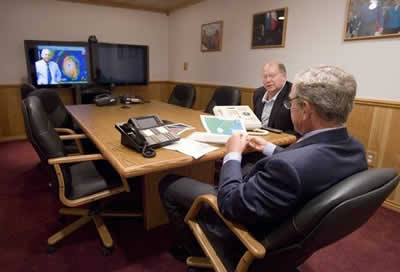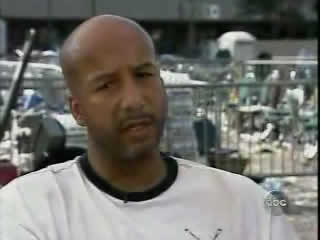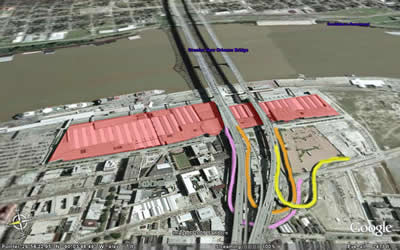Louisiana. Floods. Poverty. And, on 8 September the 70th anniversary of the day Louisiana Senator Huey P. Long was assassinated (he died two days later) in the capitol building he built in Baton Rouge: 8 September 1935.
In 1992, just before the election that replaced George H.W. Bush in the White House with William Jefferson Clinton, I wrote this essay for the first issue of my book review magazine, Plant’s Review of Books. It’s been one of the most popular items on my site for over ten years.
Incidentally, on 8 September 2005, the Global War on Terror will have lasted as long as the American Civil War.
Huey Long
by T. Harry Williams
Bantam, 1969
It is a measure of the depth of desire for change in this country that we’ve seen not just the ghost of Harry Truman pop up but also, lurking in the corners of the political discussion, the specter of Huey P. Long. Columnists across the country, from the national level to the Oregonian‘s own David Reinhard (yes, David Reinhard!) have mentioned the Kingfish in their election-year chatter. Used most often merely as a touchstone of rabble-rousing, anti-intellectual, brute force demagoguery, at times Long is shaken aloft as an example of the Bolshevist, fascist, populist end we could all come to should the great unwashed be allowed to have their way with us.
Of course this leads one to the question of just who us is (or are). Or perhaps more pointedly, who are they? And who was Huey Long that he should be a bogeyman of modern American politics, despised by those on the right, left, and center?
Many know of the Railroad Commissioner, Governor, and Senator from Louisiana only through the fictional mirror of Robert Penn Warren’s Pulitzer Prize-winning All the King’s Men. Or the stage play. Or the Academy Award-winning movie. Warren’s Willie Stark is a tireless self-promoter, a man driven to accumulate power and fortune at the expense of all those around him, whose one contribution to the common good, a hospital, literally backfires when its director shoots him.
The Huey Long of T. Harry Williams’s (again) Pulitzer Prize-winning biography shares all of Stark’s qualities and more. The more being specifically the accomplishments and advances that Long brought to a state that, in his time as now, languished near the bottom of the nation not only geographically but in average income (thirty-ninth of forty-eight), farm property value (forty-third), and literacy (forty-seventh). In an era when Wisconsin had four millionaires, Louisiana had one, and if the general poverty of the state wasn’t enough, Williams relates:
[Educational and other services] were poor for the additional reason that the ruling hierarchy was little interested in using what resources the state had available to provide services and was even less interested in employing the power of the state to create new resources so that more services could be supported…. A woman who was a member of the caste described its psychology frankly: “We were secure. We were the old families. We had what we wanted. We didn’t bother anybody. All we wanted was to keep it.”
Those were the people that Huey Long took on in his meteoric rise toward what he was unabashed in admitting was his goal: the Presidency. Long’s plan was to “Share Our Wealth,” and he wasn’t about to wait for the wealth to trickle down to the general populace of Louisiana (or anyplace else that might elect him to high office). To the (comparatively) wealthy, “Share Our Wealth” seemed less the outstretched palm of an occasional beggar than the rending claws of an army of zombies. Apart from the aristocracy of New Orleans and Baton Rouge, Long took on the lumber, sugar, and oil industries in the state, most notably Standard Oil, Louisiana’s largest economic power and “the only really big corporation in the South.”
Huey Long’s first (unsuccessful) bid for governor in 1924, at the age of thirty, was based on a platform of road construction, increased support for public schools, free textbooks for all children, improvements in the court system, and state warehouses for storage of farm crops.
He approved the right of labor to organize, and he condemned the use of injunctions in labor disputes, corporate influence on government, and concentrated wealth (the “bloated plutocracy” of two per cent owned sixty-five per cent of the wealth)…. He had said what he stood for — an increased role for the state government in the economy — and if he decided to denounce in his own style the things he had said he was against, blood might indeed appear on the moon.
As Williams’s largely respectful biography attests, the concentration of wealth was a long-time concern of Huey Long’s which fully formed during his law studies. Charles Payne Fenner, an authority on civil law, spoke to Long’s class on the practicality of Louisiana’s inheritance law, based on Napoleonic code, which stipulates that all heirs to an estate, both male and female, receive a certain share. Williams conjectures that as Huey spoke to Fenner privately afterward, one of them made the connection between Hebrew law and wealth, because afterward Long turned to study of the Bible.
[W]hat struck him particularly were the commandments [in Leviticus] that every seven years there should be a release of debts and that every fiftieth year, the “Jubilee” year, there would be a return of possessions to every man…. This was not the first time he had heard the question raised…. But now it was brought before him in a peculiarly authoritative and institutional way….. It was ironic that he should have learned the lesson at such a citadel of conservatism as Tulane University.
While reading Huey Long it’s easy to understand how the brash young farmer’s boy from poor Winn parish, where “young bloods of Huey’s age thought it was the height of urban elegance to saunter into one of the eateries and order `a chili,'” might have offended the sensibilities of the established order. Quite apart from his politics, his campaigning style, with its innovative use of mailed circulars, automobile stumping, radio speeches, sound trucks, and cruel personal invective was designed precisely to appeal to that part of the populace that wasn’t sitting in the halls and offices of power. Long knew what appealed to them in part because he was one of them, and though blessed with a phenomenal memory, razor-sharp wit, and a personality that drove him to work twenty hours a day, he was nonetheless the product of his upbringing in Winnfield, a town where some of the stores and shops were located in tents, where there were no sidewalks, no paved streets, and farm stock roamed the town.
Little of Long’s early life is well-documented, perhaps because no one thought he’d amount to much. Long himself gave a variety of answers about some episodes in his life, depending on the audience and time of day. Almost necessarily, the portrait of Long that Williams paints, drawing on over a decade of research and interviews with hundreds of Long family members, friends, associates, and enemies, contains a plethora of contradictory stories. When given the option between positive and negative views of his subject, Williams predominantly chooses the former. His decisions are naturally backed up with volumes of supporting evidence–not the least of which are the actual accomplishments of Long’s tenure as governor and senator.
Long did more than just talk about the things he campaigned for. When he won the gubernatorial election on second try in 1928, he embarked upon a series of changes that went beyond reform to outright rebellion against the ruling class. He raised severance taxes on natural resource industries to pay for schoolbooks for every child, regardless of whether they went to public or private school. During his term as governor, the state built over 2,300 miles of paved roads, 111 bridges, and in 1931 employed ten percent of the men involved in road-building nationally. He moved to abolish the practices of strait-jacketing and chaining and to introduce dental care at mental institutions (at one, he claimed, dentists extracted seventeen hundred diseased teeth from inmates). Long’s appointee as head of Angola, still considered one of the toughest prisons in the country, instituted the state’s first prisoner-rehabilitation program. Long implemented an adult literacy program in Louisiana that largely served African-Americans, despite the racism of the overwhelming white majority. The list is extensive and surprisingly progressive for the time, the place, and most particularly the man he has been portrayed as. Many of his progressive policies were unthinkable to large sectors of his electorate, but the breadth of his programs drew in people who supported him in some areas and not others.
Williams details the political career of Huey Long exhaustively. Many of the chapters chronicle a blinding array of events condensed into a period of time that seems far too short to contain them. What is more incredible is that chapter after chapter covers a parallel set of events occurring within the same time frame.
What made critics claim Huey Long was the “despot of the delta,” the “first great native fascist?” It is true, Long abused his position as governor of Louisiana-he was far from the first. He appointed members of his family and supporters to government jobs. He rewarded political benefactors with state contracts. He used the position to live a fine life and dress swell. Show me a politician who hasn’t done at least two of the above and I’ll show you a politician who didn’t get elected. What set Long apart from the fascists was his belief in the democratic process. Long would, as Williams demonstrates in his opening paragraph, do just about anything to get people’s votes except lie to them about what he’d do. What Williams reveals to us in Huey Long is a man who bent every fiber in his body to force it into the same mold as his will. Louisiana was his because the people of Louisiana had given it to him, and they’d done that because he told them in no uncertain terms what he was going to do with it. That directness and honesty set Long apart from his predecessors in and of itself, apart from his radical message.
Long’s exploits as governor (he once met the commander of a German cruiser in his pajamas and he touched off a debate over the merits of crumbling or dipping cornpone into the Southern dish known as potlikker) propelled Louisiana and himself onto the national stage, just in time for his election to the US Senate. In the Capitol, he advocated legislation that would prohibit family incomes of more than one million dollars a year (or three hundred times the annual family income) and prevent ownership of more than five million dollars (or three hundred times the average family value) by any one family. He attacked his own party’s leadership in the Senate, denouncing them as corporation attorneys in the pockets of big business, and producing lists of the clients of their law firms. He openly broke with President Roosevelt (who, while governor of New York, had offered that when eating potlikker he crumbled his cornpone), when it became clear to him the President wasn’t advancing on redistribution of wealth. Siding with progressive Republicans from the Midwest farm states, Long rammed through an extension of bankruptcy privileges to farmers hit hard by the Depression, over the objections of the administration. After he denounced his old enemy, Standard Oil, for bankrolling Bolivia in its oilfield war with Paraguay, the grateful Paraguayans named a stronghold “Senator Huey Long Fort.” The Share Our Wealth Society rose from nothing in early 1934 to 27,431 chapters, in every state, with a total membership of more than four and a half million, in less than two years. Tourists in Washington, Williams recounts, wanted to see: “White House, Monument, Capitol-and the Kingfish.” People responded to Huey as they did to nothing else at the time. “After one of his radio speeches and during one of his encounters with the Roosevelt administration, more than thirty thousand letters a day poured in for twenty-four consecutive days.”
A number of people have ridden the populist bandwagon this year. George Bush, that pork-rind eatin’ guy from Texas, who just happens to have a multi-million-dollar estate in Maine and no friends who aren’t members of country clubs; Bill Clinton, whose supporters claim will be unfettered by his backwoods state now that he’s President and who hasn’t accomplished in all his time as governor of Arkansas what Long accomplished in four years in Louisiana sixty years ago; and Ross Perot, who has about three billion reasons he’s not qualified to be a `man of the people’ and still hasn’t said exactly what he’s going to do except make things better. What all of them lack is Long’s sense of purpose, his determination to do for the people what he had said he would do for them, no matter how difficult, no matter who he had to fight or outfox. That such a radical candidate was elected in what has always been a conservative state was a measure of the times and the disgust of the people with the status quo. Populist campaigns are a barometer of how difficult the times are, and if you think things are bad now, wait until you hear a politician comparing himself (or herself) to Huey Long.


